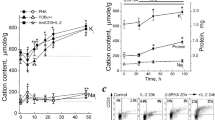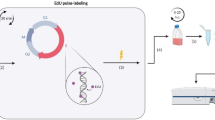Abstract
PHYTOHAEMAGGLUTININ (PHA) has been widely used an a mitogenic agent in leucocyte cultures since its actions, as a mitogenic agent was discovered several years ago1. Little is known about the chemical structure or mechanism of action of the extract, however. Though PHA is generally thought to act as an antigenic agent in, bringing about lymphocyte transformation and division, the exact mechanism of action is unknown. Recently, Razavi2 reported cytoplasmic localization of fluorescein labelled PHA in cultured leucocytes.
This is a preview of subscription content, access via your institution
Access options
Subscribe to this journal
Receive 51 print issues and online access
$199.00 per year
only $3.90 per issue
Buy this article
- Purchase on Springer Link
- Instant access to full article PDF
Prices may be subject to local taxes which are calculated during checkout
Similar content being viewed by others
References
Nowell, P. C., Cancer Res., 20, 462 (1960).
Razavi, L., Nature, 210, 445 (1966).
Li, J. G., and Osgood, E. E., Blood, 4, 670 (1949).
Author information
Authors and Affiliations
Rights and permissions
About this article
Cite this article
CONARD, R. Autoradiography of Leucocytes cultured with Tritiated Bean Extract. Nature 214, 709–710 (1967). https://doi.org/10.1038/214709a0
Received:
Issue Date:
DOI: https://doi.org/10.1038/214709a0
This article is cited by
-
Origin of Small Lymphocytes following Blastogenesis induced by Short-term PHA Stimulation
Nature (1970)
-
Phythämagglutinin (PHA) und Serumproteine in der Lymphocytenkultur
Zeitschrift für Die Gesamte Experimentelle Medizin einschließlich experimentelle Chirurgie (1970)
Comments
By submitting a comment you agree to abide by our Terms and Community Guidelines. If you find something abusive or that does not comply with our terms or guidelines please flag it as inappropriate.



